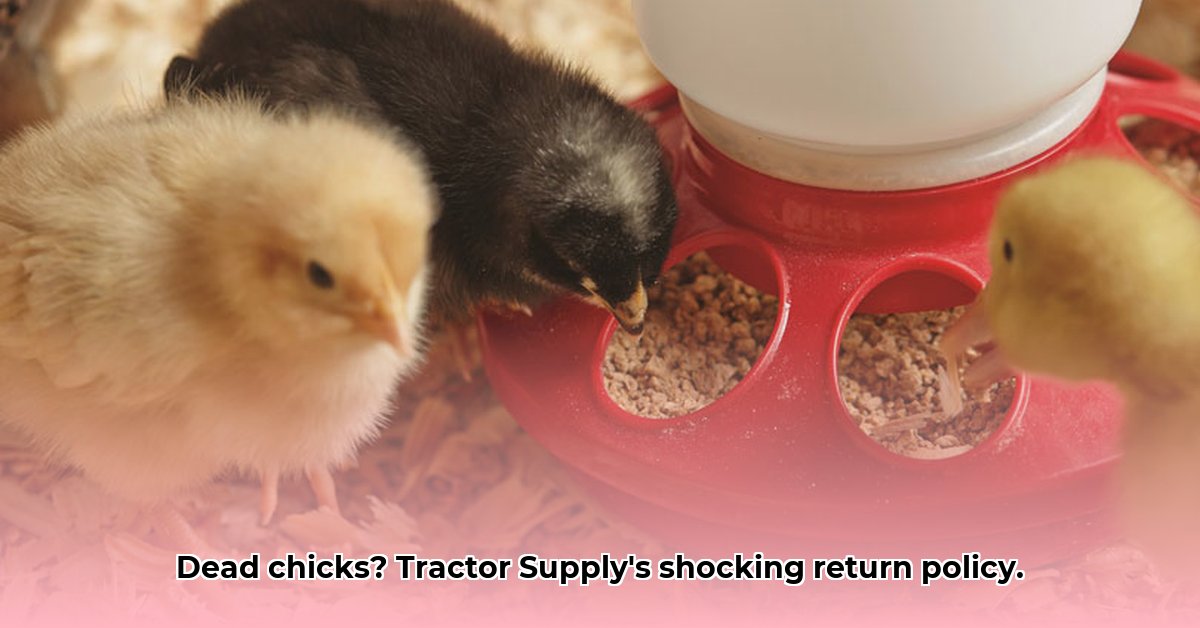
Tractor Supply Chick Return Policy: Navigating the Challenges
Losing baby chicks is heartbreaking, especially when you've invested time and resources in their care. For backyard poultry farmers purchasing chicks from Tractor Supply, the lack of a clearly defined return policy for deceased chicks presents significant challenges. This guide provides actionable steps to navigate this situation and advocates for improved transparency and practices within the poultry industry. For other Tractor Supply return policies, see their return policy site.
The Unclear Policy: A Source of Frustration and Risk
Tractor Supply's website currently lacks a specific, readily accessible return policy for deceased chicks. This ambiguity creates widespread frustration among customers. The absence of clear guidelines leaves consumers uncertain about their rights and recourse in cases of chick mortality. This lack of transparency also presents significant biosecurity risks. Dead or sick chicks can be vectors for disease transmission, impacting not only individual flocks but potentially the wider poultry community. This poses significant economic and health consequences. How can we ensure a more transparent and supportive process for consumers facing this difficult situation?
Beyond Individual Losses: The Broader Impact on the Poultry Industry
The implications of this unclear policy extend beyond individual consumer experiences. The lack of a system for addressing chick mortality creates potential for disease outbreaks, impacting both backyard poultry keepers and larger commercial operations. A clear return policy is not merely a customer service issue; it is a crucial element of biosecurity and responsible poultry farming. Increased transparency and accountability throughout the supply chain are essential for mitigating these significant risks. What steps can the industry take to minimize the risk of disease transmission and economic losses caused by chick mortality?
Actionable Steps: Protecting Your Flock and Advocating for Change
Here's a practical, step-by-step guide to follow if you experience chick mortality after purchasing from Tractor Supply:
Meticulous Documentation: Immediately document all relevant information. This includes purchase date, number of chicks, receipt details, observations of any illness, and dates of death. Take clear photos as evidence. (Thorough documentation significantly increases the likelihood of a successful resolution).
Direct Communication with Tractor Supply: Contact the specific Tractor Supply store where you made the purchase. Clearly and calmly explain the situation, providing all documentation. (A calm and professional approach is more likely to generate a positive response).
Escalate to Higher Management: If your initial contact is unsuccessful, escalate your concern to the store manager or contact Tractor Supply’s corporate customer service. Maintain a record of all communications. (Persistence is key when dealing with unclear policies).
Engage with Your Community: Connect with other backyard poultry keepers online or in your area. Sharing experiences and advocating collectively can put pressure on Tractor Supply and other stakeholders to improve practices. (Community support empowers individuals and increases the potential for systemic change).
Advocate for Policy Reform: Contact Tractor Supply’s corporate office to advocate for a clear and consistent return policy for deceased poultry. Highlight the biosecurity risks and economic impacts of the current ambiguity. (Direct contact with corporate offices ensures your concerns reach decision-makers).
Shared Responsibility: A Collaborative Approach to Improvement
The responsibility for addressing this issue doesn't rest solely with Tractor Supply. Poultry breeders and regulatory agencies play a critical role in ensuring biosecurity and the health of chicks. Breeders need to implement robust quality control measures. Regulatory bodies must enforce strong biosecurity measures to prevent disease outbreaks. This is a collaborative effort requiring transparency and accountability throughout the entire poultry supply chain. How else can we create a more robust and resilient system?
Minimizing Risk: Proactive Steps Before and After Purchase
Preventing chick mortality is always the best approach. Here's how you can enhance your chances of success:
- Thorough Research: Research proper chick care techniques before purchasing chicks. Understanding their needs is crucial.
- Safe Transport: Use a suitable, temperature-controlled carrier to transport your chicks safely.
- Prepare the Brooder: Ensure your brooder is set up correctly with appropriate heat, food, and water before the chicks arrive.
- Careful Observation: Examine the chicks thoroughly upon arrival. Address any issues immediately.
By taking these preventative steps and advocating for policy changes, we can create a more supportive environment for backyard poultry keepers and improve the overall health and sustainability of the poultry industry. Clear communication, transparency, and proactive engagement are essential in navigating this complex issue.